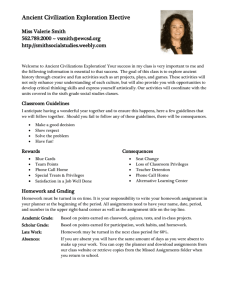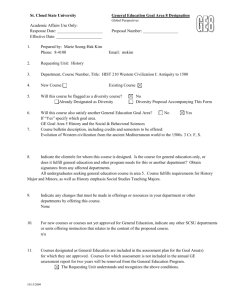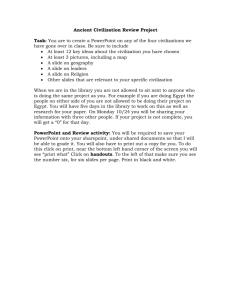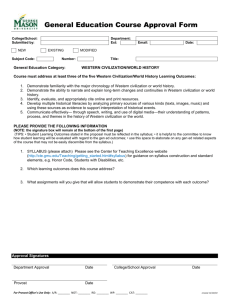Syllabus CCD HIS 101 - History of Western Civilization 1 section
advertisement
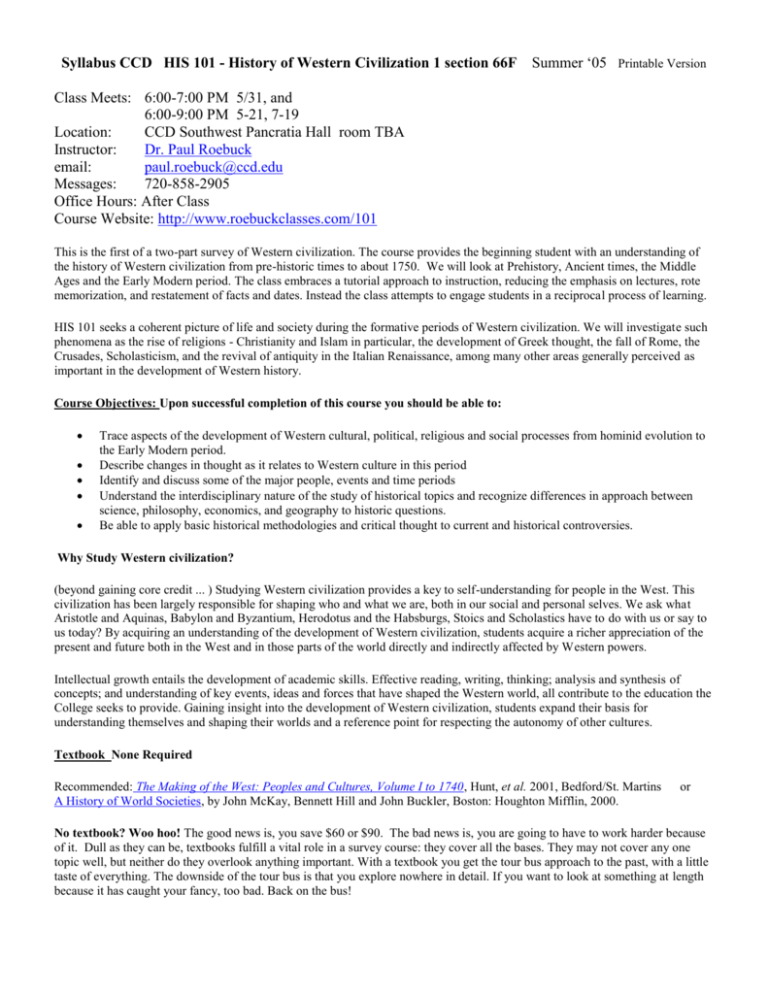
Syllabus CCD HIS 101 - History of Western Civilization 1 section 66F Summer ‘05 Printable Version Class Meets: 6:00-7:00 PM 5/31, and 6:00-9:00 PM 5-21, 7-19 Location: CCD Southwest Pancratia Hall room TBA Instructor: Dr. Paul Roebuck email: paul.roebuck@ccd.edu Messages: 720-858-2905 Office Hours: After Class Course Website: http://www.roebuckclasses.com/101 This is the first of a two-part survey of Western civilization. The course provides the beginning student with an understanding of the history of Western civilization from pre-historic times to about 1750. We will look at Prehistory, Ancient times, the Middle Ages and the Early Modern period. The class embraces a tutorial approach to instruction, reducing the emphasis on lectures, rote memorization, and restatement of facts and dates. Instead the class attempts to engage students in a reciprocal process of learning. HIS 101 seeks a coherent picture of life and society during the formative periods of Western civilization. We will investigate such phenomena as the rise of religions - Christianity and Islam in particular, the development of Greek thought, the fall of Rome, the Crusades, Scholasticism, and the revival of antiquity in the Italian Renaissance, among many other areas generally perceived as important in the development of Western history. Course Objectives: Upon successful completion of this course you should be able to: Trace aspects of the development of Western cultural, political, religious and social processes from hominid evolution to the Early Modern period. Describe changes in thought as it relates to Western culture in this period Identify and discuss some of the major people, events and time periods Understand the interdisciplinary nature of the study of historical topics and recognize differences in approach between science, philosophy, economics, and geography to historic questions. Be able to apply basic historical methodologies and critical thought to current and historical controversies. Why Study Western civilization? (beyond gaining core credit ... ) Studying Western civilization provides a key to self-understanding for people in the West. This civilization has been largely responsible for shaping who and what we are, both in our social and personal selves. We ask what Aristotle and Aquinas, Babylon and Byzantium, Herodotus and the Habsburgs, Stoics and Scholastics have to do with us or say to us today? By acquiring an understanding of the development of Western civilization, students acquire a richer appreciation of the present and future both in the West and in those parts of the world directly and indirectly affected by Western powers. Intellectual growth entails the development of academic skills. Effective reading, writing, thinking; analysis and synthesis of concepts; and understanding of key events, ideas and forces that have shaped the Western world, all contribute to the education the College seeks to provide. Gaining insight into the development of Western civilization, students expand their basis for understanding themselves and shaping their worlds and a reference point for respecting the autonomy of other cultures. Textbook None Required Recommended: The Making of the West: Peoples and Cultures, Volume I to 1740, Hunt, et al. 2001, Bedford/St. Martins A History of World Societies, by John McKay, Bennett Hill and John Buckler, Boston: Houghton Mifflin, 2000. or No textbook? Woo hoo! The good news is, you save $60 or $90. The bad news is, you are going to have to work harder because of it. Dull as they can be, textbooks fulfill a vital role in a survey course: they cover all the bases. They may not cover any one topic well, but neither do they overlook anything important. With a textbook you get the tour bus approach to the past, with a little taste of everything. The downside of the tour bus is that you explore nowhere in detail. If you want to look at something at length because it has caught your fancy, too bad. Back on the bus! Syllabus CCD HIS 101 - History of Western Civilization 1 section 66F Spring ‘04 2 I have abandoned the textbook for several reasons, but both you and I have to do the work that was formerly done by the textbook. While we get to explore, we still need to try to cover all the bases. After all, if a French tourist spent six weeks in Colorado then went home, she could say she learned a lot, but she could not say she had seen America. This course is about Western history from prehistory to the ancient Greeks and Romans up to the American Revolution. Somehow, you have to read a little about everything important across that entire 400,000-year span. Your job is to do the reading and to demonstrate your understanding through a series of assignments, including class discussion on blackboard. My job is to construct good assignments and to evaluate your work, but it's also to let you know what constitutes "the basics" and show where you might find information about them. I've done that by my choice of topics for assignments, my choice of online readings (including my own essays), and by providing some standard reference tools such as the timelines or maps. In a traditional class, you read the textbook(s), attend the lectures, and that's it. You know the boundaries of what's expected. This class works a little differently. You have a core set of expectations: participate in discussion, and do the assignments. I have provided a set of resources online, but I expect that you will read as much as you need to read in order to do what's assigned. How much is that? I cannot say, for the amount one person reads to gain understanding will be different from the amount another reads. This varies not only by native intelligence but also by how fortunate you are in your choice of reading material. The trouble with online information is that certain topics get done to death while other topics are neglected. The Net reflects the preoccupations of humanity in general, which are *ahem* not entirely academic in focus. For all its terabytes of information, the Net does not contain all of what can be found in any freshman college history book. I've done my best to show the gaps and to provide ways for you to fill them. That's one of the reasons for the short writing assignments and in-class presentations. But you will certainly wind up consulting physical books. If you happen to have a history textbook around the house, you will no doubt find it useful. There are several in the library and I recommend consulting those. Class Procedures: This course combines independent reading and research, class discussion and special assignments. Students are invited to ask questions at any time in class, in online discussion or via email. I recommend that you ask in the Discussion Boards so that other students can benefit from your question and answer Success in this course depends on participation. Come to each class prepared to question and discuss the issues at hand. Assigned readings and writings must be completed prior to class. Keep good notes - it is your responsibly to be able to argue pro and con on the major discussion points. Keep up in the online discussions. To aide you in this, check out the online discussion questions, the What You Should Know Sections and the Analytic Questions for each of the courses three segments. These questions will highlight some of the important aspects of each topic keeping in mind our goal of understanding various ways of knowing about the world. Late assignments, make-ups, retakes, and incomplete If you have an emergency and cannot complete an assignment on time, discuss your need with me (preferably in advance). In general, no late assignments or make-ups will be allowed. However, there are extenuating circumstances, so explain your situation. You must seek the approval of your instructor in advance for an incomplete, and justify your request with a validated medical emergency or a severe personal crisis. Incompletes are given if the student has completed the majority of the work for the course, has been unable to complete all of it for a valid reason, and will pass the course if they are given an opportunity to complete the required work within a specified time period. Changing Grades Challenge your grade on any assignment or test if you feel your efforts were graded incorrectly, but you must do so within one week of an assignment's return date. Special Needs If you have a learning or physical need, please let me know about any accommodations you would like me to make after the first class. CCD has support services available to assist you in your academic success. Academic Misconduct Admission to the Community College of Denver implies that you agree to respect the rights of others and observe moral and civil laws. Interference with the normal processes of education in the classroom or elsewhere on the campus will be regarded as Syllabus CCD HIS 101 - History of Western Civilization 1 section 66F Spring ‘04 3 unacceptable conduct, warranting suspension or dismissal. Complete Student Code of Conduct is at this web site: http://ccd.rightchoice.org/Student_Life/COC.html. CCD's policy is that any student who breaks the college's honor code and is found culpable after due process, will receive an "F" for the assignment. CCD has recently relaxed the standards associated with academic honesty. I, however, take plagiarism very seriously. It has always been my policy that students guilty of plagiarism receive an F in the course. I believe they should be expelled from the college as well but that is outside of my jurisdiction. However I have control over grading in the classroom. If, after due process, you are found guilty of plagiarism, you will forfeit all class participation points, you will receive zero on the assignment, and your other class work must be of excellent quality or your semester score will be so low that you will receive an F in my course. Due process is defined by the Vice President for Student Services. Academic misconduct comprises scholastic dishonesty or class misconduct. Scholastic dishonesty includes cheating in assignments; plagiarizing (misrepresenting as one's own anything done by another); depriving another of necessary course materials; or sabotaging another's work. Class misconduct is disrupting or disrespectful behavior in class. Denigrating comments, reading newspapers during presentations, rude disruptions, online harassment and persistent tardiness are examples of class misconduct. Either scholastic or class misconduct is grounds for dismissal from the course. Please avoid it. From the CCD Code of Conduct: Admission to the Community College of Denver implies that you agree to respect the rights of others and observe moral and civil laws. Interference with the normal processes of education in the classroom or elsewhere on the campus will be regarded as unacceptable conduct, warranting suspension or dismissal. Disciplinary proceedings for violations of standards of conduct are the responsibility of the Vice President for Student Services. Conduct for which students are subject to discipline includes: 1. 2. 3. 4. 5. 6. 7. 8. 9. 10. 11. 12. 13. 14. 15. Dishonesty, such as cheating, plagiarism, or knowingly furnishing false information to the college. Forgery, alteration or misuse of college documents, records or identification. Obstruction or disruption of teaching, administration, disciplinary procedures or other college activities. Physical abuse of or action which threatens the health or safety of any person on college-owned or controlled property or at college-sponsored functions. Theft of, misuse of, or damage to property. Unauthorized entry to or use of college facilities; unauthorized use of college equipment. Manufacture, possession, control, sale, transmission, or use of any substance in violation of state or federal laws. (The college has the policy of full cooperation with law enforcement agencies in such cases.) Disorderly, indecent, or obscene conduct on college-owned or controlled property or at college-sponsored functions. Abuse or unauthorized use of alcohol (see State Liquor Code). Condoning any act by another student which violates college policy. Unauthorized representation or contracting in the name of the Community College of Denver. (A student may not claim to be an official representative of the college for any commercial purpose.) Verbal or written communication which threatens, or unlawfully exposes, any individual or group to hatred, contempt, or ridicule, and thereby injures the person, property, or reputation of another. Sexual harassment, verbal or written, will not be tolerated. Dress which fails to meet established safety or health standards in specific classes and on college-owned or controlled property or at college-sponsored activities. Possession of weapons, fireworks, or explosives. (Weapons are defined as firearms, knives, explosives, inflammable materials, or any other items that may cause bodily injury or damage to property.) Assignment Instructions During week one: Introduce yourself to the class by posting in the student lounge. 10 points. Send an email to the instructor and get a reply to ensure that email is working. 10 points. Each week you will turn in to the discussion list on blackboard post one identification or narrative in your own words. Cite your sources. In your subject line include assignment type, week number, and your name. For example: Subject: narrative-week 3-Paul Roebuck. to the discussion list on blackboard post at least 3 good messages a week. Cite your sources. Try to stay on topic for that week. Syllabus CCD HIS 101 - History of Western Civilization 1 section 66F Spring ‘04 4 When we meet on 6/21 There will be an in-class midterm examination at the end of Ancient Times. You will do an in-class presentation of your Timeline on Ancient Times You will write two short analytic papers over the semester: Analytic paper on Middle Ages email to me 7/12 and present it in class on 7/19 Analytic paper on Early Modern history due by email to me by August 2 For this class, weeks begin on Tuesday and End on Monday at midnight See grading for point values for assignments If you miss a classroom session you will lose 100 points At the end of the course, send me a self , 10 points. a class evaluation 10 points. The details on each of these types of assignments are below: Identification You identify something by saying who, what, where, when, and why. If it's a person, the who is a bit redundant, but it might be relevant to state their full name or something. The "what" means saying the person was a Queen or a reformer or whatever. Their main role on the historical stage. "Where" is where the person lived, where the battle was fought. Give what detail you can. Thus, you can say the Battle of Crécy took place in France, or you can say it took place in northern France, or about 25 miles north of Paris - whatever you can find. "When" means when they lived. For rulers, it's sufficient to give when they ruled--you don't always need exact birth and death dates. If it's a battle, give the year. The "why" concerns historical significance. The Battle of Crécy was important because it was the first major victory of the English over the French in the 100 Years War. You could say more. This is the really important part of the answer, yet it is often completely left out by students. The Identification assignment usually comes in under 100 words. You can often state the who, what, where and when portions in a single sentence. For example: The Battle of Crécy was fought between the English and French at a site in northern France in 1346. Then, all you would need is a sentence or two on the significance. Some answers are easier to compact than others. There is no length limit but strive for both completeness and brevity. Try to go beyond a single source in your search for explanations. Cite your sources. Narrative Here you just tell the story of an event, a career, a development. The key with the narrative assignment is clarity. Your narrative should have a clear beginning, middle and end. It needs to stay on topic and not wander off on side issues or get distracted by giving too much background. Just narrate the events. This assignment will take more words. The length will be determined by the topic, but typically will run 50 to 200 words. Try to go beyond the book in your search for narrative information. Timeline Textbooks on Western Civilization are often organized both temporally and topically but often do not always follow a strict linear progression. There are a lot of ancient civilizations and it is hard to keep track of who was doing what where and when. To help you keep track of what was going on when, create a timeline of significant events (significant to you) of some portion of Ancient history through 650 AD. Content is up to you. Choose people, events and places that interest you. I have had students trace history of agriculture, irrigation, warfare, religion, philosophical movements, development of writing, technological inventions, changes in roles of women, migrations of the Celts, and the flourishing of literary and artistic movements. Anything prior to 650 AD is okay. Syllabus CCD HIS 101 - History of Western Civilization 1 section 66F Spring ‘04 5 Format is up to you. A simple linear progression on paper is fine. Some students create web pages or power point presentations. Some create scrolls or mock up newspaper accounts. Be creative and have fun. These will be presented in class so you will also get a chance to do public presentation. Midterm examination There will be an in-class Midterm examination. You will be tested over the primary and secondary readings and the class postings on Blackboard. See the What You Should Know sections for each of the three segments, Ancient, Middle Ages and Early Modern. Complete the readings for ancient times. Analysis This is your basic history essay or short paper. The key to this assignment is in the name: analysis. Your paper will probably contain some identification and some narrative and maybe even a definition or two, but if you don’t do any analysis of the event or person or development, then you aren’t really doing this assignment. All of the basic paper-writing rules apply here: have a clear thesis statement, include in your paper only those facts that go toward supporting your thesis (unless your paper is specifically addressing differing points of view). You must include a bibliography of sources you consulted or referenced. There is not enough room here to teach you about how to write a term paper, even a short one. See Student Guide to Writing a Paper. Also go to CCD’s writing center for help The Writing Center is at 1111 West Colfax, South Classroom Room 142 N, P & T Each Analysis paper should be no less that 750 words and preferably no more than about 1250 words. The lower limit is inflexible and you will be graded down if you go below it. The upper limit is a strong suggestion. This upper limit is to encourage you to be thorough but brief. It sets a limit on how much effort I expect you to expend on this project. It helps you define the scope of the activity. It teaches you to edit your papers for content. Presentation When we meet you will present your paper (timeline and analytic paper). Presentations are half of the grade for the analytic paper. Most people do not like public speaking but the practice will help. I went into teaching because I was terrified about speaking in front of audiences. Experience does help. Do not read your paper, summarize it. Tell us the title and your thesis statement. Give us the arguments pro and con and give us your conclusion. Be prepared to answer questions from the class on your topic. Handouts and visual aides are fine but not necessary. If you have online visuals you need to send them to me in time for me to get them on to the class site. Submitting Assignments Assignments are late if they are turned in after the due date. I will give extensions if you have a valid excuse, but you must talk to me by email or after class to receive an extension – preferably before the due date. Required assignments are required. You must turn in all required assignments in order to pass the course, no exceptions. Unexcused late assignments will not receive any points, however, they still must be turned in to me in order to pass the course. Send your analytic papers to me by email at least one day before class. I accept attachments in HTML, Word, RTF and text. When you save your file, make sure your name is in the document itself and include your initials in the file name. Example: pranalysispaper1.doc Post your weekly comments to the period discussion board. Remember this is one third of your grade. Post your weekly identifications or narratives to the assignments discussion board. In your subject line include assignment type, week number, and your name. For example: Subject: narrative-week 3-Paul Roebuck Syllabus CCD HIS 101 - History of Western Civilization 1 section 66F Spring ‘04 Assignment 6 Expectation Points Blackboard Introduction Required 10 Email Professor Required 10 Identification or Narrative (post one each week) Required 25 Online Discussion Participation (3+/week) Required 25 Midterm Examination Required 50 Timeline Required 50 Identification or Narrative (post one each week) Required 25 Online Discussion Participation (3+/week) Required 25 Middle Ages analytic paper Required 50 Identification or Narrative (post one each week) Required 25 Online Discussion Participation (3+/week) Required 25 Early Modern Period Analytic paper Required 50 Ancient Times Middle Ages Early Modern Self Evaluation by email to Professor 10 Class Evaluation by email to Professor 10 Class Participation Grading Scale Required 500 If you miss a classroom session you will lose 100 points. Grading Scale 90%+ is an A 80%+ is a B 70%+ is a C 60%+ is a D Below 60% is an F What You Should Know The WYSK page for each study section is not what you should know before the class, but rather what I think you should know once you've finished the class. As students, we take it for granted that we should know whatever it takes to pass the exam. But I've pulled the rug out from under you there, because I don't give exams (some have claimed my classes are nothing but one long exam!). But I feel it's important for you as the student to have some sense of what out of the great flood of information you will learn is central or crucial. In that spirit, I offer for each section a simple page. The idea is that if you have learned what I intend for you to learn, then you should be able to speak or write at least something, at least somewhat coherently, on each of the items there. Used another way, if you find at the end of the section that there are one or more points that just flat doesn't ring a bell, then you ought to go back and review the sources, because we really did touch on each of them. Syllabus CCD HIS 101 - History of Western Civilization 1 section 66F Spring ‘04 7 Secondary Sources These are what would be the lectures in a live class . I have written a few of them, but I've also used essays written by others, especially those done by Skip Knox, Lynn Nelson and Steven Kreis, three pioneers of teaching history via the Internet. The Secondary Sources provide a common core of historical writing for the class, but you should not regard these as being either complete or comprehensive. Expect to supplement them with secondary sources of your own. An old college textbook would be good. If you can't find one at a used bookstore, any college library will have some in their stacks that you can check out. Primary Sources These are documents written by people who lived during the times we are studying. They are the meat-and-potatoes of historical scholarship. Whereas with the Secondary Sources I encourage you to supplement the online resources, with the Primary Sources we have an abundance. You are certainly welcome to find source collections on your own, but I think you'll find there's more than enough right here. At first it looks like there's a lot to read, but most of the sources are hardly more than a page or two, so don't panic. That said, reading primary sources is a lot more difficult than reading modern works. For some advice on how to read this kind of material, take a look at the resources I link to in the Study Guide. General Reference Works This is the bibliography for the course. I add to it at random; it's never "finished". I don't intend the list to be complete, nor do I intend that it is somehow the "best" books. It's simply a collection compiled over time that is intended to help you when you want to know more about something. You should be able either to find these works in our library, or to order them through Interlibrary Loan. Paths Paths are nothing more than trails you can explore. One of the most common comments I get is that students have a hard time thinking of things to talk about. If you find yourself in such a position, go explore one of the Paths. I've selected ones that can be followed in some depth on the Internet, though if you really get interested you will want to go visit the library too. In other words, the Paths are not an assignment. They are simply a convenient packaging of information, along with some comments and questions from me to help you in your exploration. Acknowledgements All of us owe a debt of gratitude to scholars who have come before us. However for this course I am especially indebted to Lynn Nelson, Professor Emeritus from Kansas University, for his advice and support. Much of the web site itself and the online course content including many essays comes from the important, pioneering and substantial efforts of Dr. Ellis L. (Skip) Knox at Boise State University who graciously gave me access to his course content. Many of the links come from Corey Likeness formerly at the University of Calgary. Maps come from many sources. There are a number of maps from Tony Belmonte's Historical Atlas of Europe and the Middle East. Unfortunately Tony has disappeared from the web and I have not been able to track him down for permissions. My copies of Belmone's maps were graciously provided by Lynn Nelson. Right-clicking and checking properties will show the sources of many objects. Thank you for taking the time to study Western Civilization. It is a fascinating subject and there is much to learn. Take time to enjoy the process and share with the class the insights you gain. Dr. Paul Roebuck Community College of Denver



